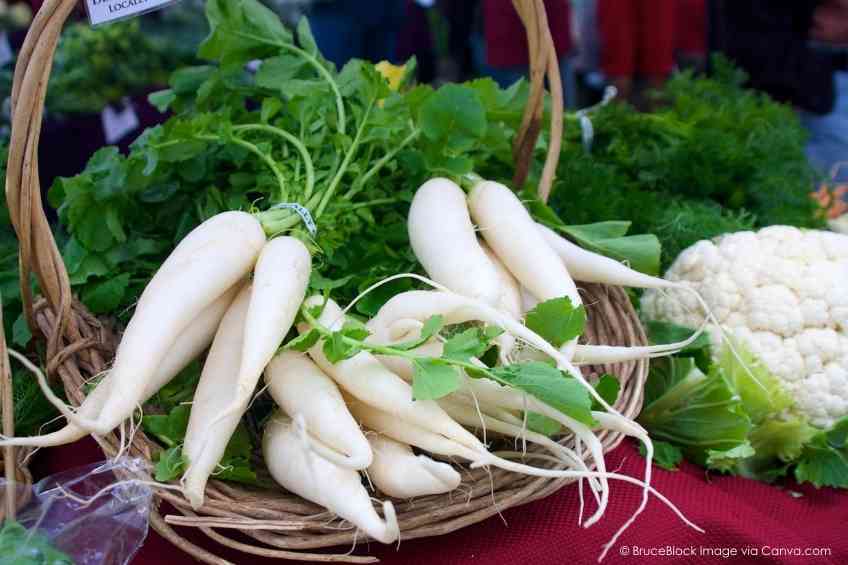The Skinny:
Never heard of Daikon? That’s a missed opportunity. It is reputed to be the healthiest radish and is prized in Asian cultures as a superfood that serves up good nutrition, rebalances the digestive system, gently detoxifies the liver and cleanses the body. It also boosts the immune system and protects against chronic diseases. The translation of Daikon from Japanese to English leaves “big root,” which aptly describes this radish. While it is similar to stand rad radishes, Daikon comes in multiple sizes, including round three-inch watermelon radishes, four- to five-inch Shunkyo, the five- to six-inch Alpine and the six-inch KN-Bravo. There are even three super-sized Daikons: The Miyashige White which can go up to 18 inches, the Daiyon Minowase which can reach 24 inches, and the Sakurajima Daikon, grown in volcanic ash, which can weigh up to 60 pounds. They all have somewhat different textures and flavors, but they deliver potential health benefits. Read on.
The Slate:
Nutritional Breakdown
A fresh Daikon root is 94.6 percent water. A 100-gram serving has only 18 calories, 0.6 grams of protein, 0.1 grams of fat, 4.1 grams of carbohydrates, 2.5 grams of sugars and 1.6 grams of fiber. It has 21 milligrams of sodium, 233 milligrams of potassium and 24 percent of the daily value of vitamin C. Of note, pickled Daikon’s contents vary, which may lead to extra salt, artificial color or monosodium glutamate.
Aids Digestion
Fresh Daikon is used to add a piquant, satisfying crunch to dishes and salads without added calories. Cut into noodles, chunks or reconstituted dried flakes, cooking enhances its sweetness and turnip-like taste in broths, soups and stews. Its leaves and roots can be added to balance the fat in deep-fried food or fatty meats and fish. It also contains enzymes that aid digestion, as does its fiber and vitamin C content.
Heart-Healthy
Daikon boasts a heart-healthy sodium/potassium ratio. But it also contains abundant quantities of a white pigment called anthoxanthin, a water-soluble flavonoid that has anti-inflammatory action and lowers cardiovascular disease risks. One study specifically notes that anthoxanthin fights atherosclerosis and cardiovascular aging by lowering cholesterol and blood pressure.
Antioxidants & Anti-inflammatory
The phytochemicals and glucosinates in Daikon radishes show promise for limited cell damage that could help prevent chronic diseases and lower the risk of certain cancers. Daikon radishes also have anthocyanins and Coenzyme Q10 (CoQ10) which have anti-inflammatory and antioxidant properties that help liver functioning and boost immune function.
A Caution
For all its benefits, those worried about excessive salt consumption or other additives should check the labels of any pickled Daikon products. People allergic to foods in the mustard family may also react to Daikon. Also, eating extreme quantities of Daikon may lead to dehydration and potentially dangerous drops in blood pressure and blood. It could also disrupt the production of thyroid hormones.
Eyes Up:
Are you into Daikon? Tell us why at info@wellwellusa.com.
WellWell editors independently identify services and products of interest. If readers purchase anything through the associated links, WellWell may earn a commission, which goes to support our work. Learn More.













